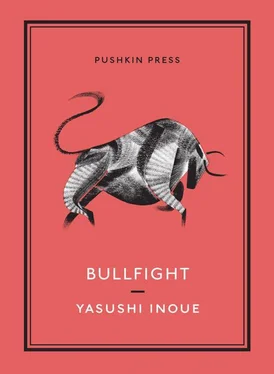Yasushi Inoue - Bullfight
Здесь есть возможность читать онлайн «Yasushi Inoue - Bullfight» весь текст электронной книги совершенно бесплатно (целиком полную версию без сокращений). В некоторых случаях можно слушать аудио, скачать через торрент в формате fb2 и присутствует краткое содержание. Год выпуска: 2013, Издательство: Pushkin Collection, Жанр: Классическая проза, на английском языке. Описание произведения, (предисловие) а так же отзывы посетителей доступны на портале библиотеки ЛибКат.
- Название:Bullfight
- Автор:
- Издательство:Pushkin Collection
- Жанр:
- Год:2013
- ISBN:нет данных
- Рейтинг книги:4 / 5. Голосов: 1
-
Избранное:Добавить в избранное
- Отзывы:
-
Ваша оценка:
- 80
- 1
- 2
- 3
- 4
- 5
Bullfight: краткое содержание, описание и аннотация
Предлагаем к чтению аннотацию, описание, краткое содержание или предисловие (зависит от того, что написал сам автор книги «Bullfight»). Если вы не нашли необходимую информацию о книге — напишите в комментариях, мы постараемся отыскать её.
Bullfight Bullfight
The Hunting Gun
The Counterfeiter
Contains a previously unpublished preface by Inoue himself.
Bullfight — читать онлайн бесплатно полную книгу (весь текст) целиком
Ниже представлен текст книги, разбитый по страницам. Система сохранения места последней прочитанной страницы, позволяет с удобством читать онлайн бесплатно книгу «Bullfight», без необходимости каждый раз заново искать на чём Вы остановились. Поставьте закладку, и сможете в любой момент перейти на страницу, на которой закончили чтение.
Интервал:
Закладка:
Tsugami protested and asked him to name his price, but Okabe simply chuckled. “This company of mine doesn’t need to gobble up a newspaper to get fat. Well, that takes care of business! Now let’s drink. I don’t know what it is, but I’ve taken a liking to you, Mr. Tsugami.”
Tsugami gave in and took up his glass. He knew he was being tricked, and yet somehow he simply couldn’t imagine this small man, happily tossing back glass after glass of whiskey, doing something as grasping and underhanded as loading up a train with goods for the black market without even asking permission.
Okabe called a woman on his staff and had her bring cheese, then told her to prepare something for dinner, too, and bring it in when it was ready. The two men talked and drank for another two hours after that, although in actuality Okabe did almost all the talking, while Tsugami half listened and half mused about the bullfight. Okabe talked about business, and when he was done with that he moved on to politics, then on to religion, women, and so on, his garrulousness finding outlets anywhere and everywhere, moving in all directions. His best observations and critiques seemed to glitter with an odd vibrancy only as long as he was offering them, in his own words; when Tsugami reflected on what he had heard, much of it was reduced to the status of distasteful commonplaces.
At a certain point, as Okabe’s speech grew considerably slurred, Tsugami’s reporterly habits kicked in and he changed the topic. “Three hundred and sixty liters is a pretty big quantity of rice and barley. How will you get your hands on so much?” All along he had been waiting for an opportunity to ask.
“Oh, there’s all kinds of ways,” Okabe said, his expression arrogantly disengaged. “Makes sense if you think about it. We send agricultural tools out to farming villages, right? So I have them send up big straw bags. How do you think it looks when you dump two liters of rice into a really big bag? Like nothing, just a little layer at the bottom. Even if someone checked, they’d think it was left over from when the bag was emptied. Ten bags and you get twenty liters. And with a hundred, a thousand…”
Tsugami was feeling sluggish now and his eyelids were growing heavy, both from the accumulated exhaustion of the past few days and because the alcohol was starting to take effect. Glancing over at the windows he realized that it was dark out now; the heat of the room had produced condensation that was running down the glass in innumerable rivulets.
“Say I do business with thirty villages in each prefecture, that’s one hundred eighty villages in the six prefectures in the Kinki region alone, and say each of them sends up a hundred bags…”
Okabe must have been drunk, too, judging from the way the hand holding his tumbler was weaving in the air. Tsugami listened to Okabe’s calculations, his consciousness a blend of haziness and clarity, unable to decide whether they were legitimate or fake, or to judge whether Okabe himself was a big-time criminal or a petty thief.
*
Tsugami awoke at eight the following morning in the night-duty room at the office. After a simple breakfast in the basement cafeteria, he went up to the editing department on the second floor for the nine-o’clock appointment he had made with Miura. Omoto, who ordinarily only came to the office in the afternoon, was sitting beside the large ceramic hibachi by the window, chatting with three young employees who had been on night duty.
Seeing Tsugami, he called out, “Pretty cloudy. I sure hope it doesn’t rain.”
The air was bitingly cold now that winter had begun in earnest, but for the past few days the sky had been beautifully clear; according to the radio, though, the run of good weather had started to take a turn for the worse the day before. The temperature had risen suddenly, too, and the sun felt warmer. Both these changes seemed cause for concern.
“I’m sure it will be fine — this weather should last another four or five days,” Tsugami said. “And the meteorologists say there’s a low pressure system in the south that’s heading up east, too.”
He had telephoned the observatory the second he got up. From his perspective, though, the more pressing problem was the hundred thousand yen he needed to get to Tashiro by two o’clock. Late the previous night, when he returned from Hanshin Manufacturing, he had called two businessmen he’d had in mind, enduring the throbbing in his head, only to learn that one of the two was unfortunately not at home, having gone up to Tokyo, while the other could probably get the funds together somehow in three or four days, but not in one or two. As emphatically as he had rejected Miura Yoshinosuke’s proposal the day before, Tsugami had been recalling the man’s face in little flashes ever since he woke up. At this point there just didn’t seem to be anywhere else he could go for a hundred thousand yen, despite his big talk; it was Miura’s plan or nothing. He mentioned the proposal to Omoto, to see what he would say, and Omoto suddenly turned grave.
“With the sky looking this ominous, my guess is Miura will retract the offer. You should have taken him up on it yesterday.” Omoto was clearly displeased with how Tsugami had responded.
“No, I think he’ll come,” Tsugami said. “He said he would be here at nine, and I don’t think he’s the sort to back down — he’ll keep his word. He’s not a man who changes his plans overnight.”
In fact, Tsugami suspected Miura would come even if it started raining.
“You’re talking about one of the best-known businessmen around,” Omoto said sourly.
Tsugami’s prediction turned out to be correct, though: Miura turned up five minutes before nine. Soon Tsugami, Omoto, and Miura were sitting around the table in the reception room.
“I’d say there’s an eighty percent chance it will rain, twenty percent chance it won’t. It’s a dangerous tightrope to cross, but I’m ready to put my money on that twenty percent. How about it, Mr. Tsugami? The idea we discussed yesterday…”
Despite the dangerous tightrope metaphor, there was no trace of uncertainty in his attitude. He held his head up in the same proud manner as the day before, keeping a close and equal watch on Omoto and Tsugami, waiting with such unruffled calm for a yes or no that it was almost cheeky. And then something odd happened.
“It’s kind of you, but I’m afraid we still can’t accept.” Omoto, not Tsugami, had spoken. He was coughing so hard that he could hardly breathe. Miura’s peculiar assertiveness had gotten on Omoto’s nerves in an odd way, and he had started feeling all of a sudden that it would be intolerable to let him make off with six hundred and sixty thousand yen that was practically theirs, as he might well do.
“I see,” Miura said, a smile on his lips that could have meant anything at all. He went on to chat for a time about recent economic trends, never once touching on the deal that had been on the table, and then he left, his stride so springy that he looked like a man who had just successfully concluded a negotiation. As soon as he was gone, Omoto and Tsugami returned to the editorial department.
“I’ll get the hundred thousand somehow. Let’s say I’ll have it by noon,” Omoto said excitedly. “The weather’s going to be fine tomorrow, I’m sure of it. No way we’re going to have it rain on us.”
After that he went around informing everyone he encountered that it would be nice out tomorrow, as if this were some sort of deeply cherished belief, wiping his nose with his handkerchief practically without pause, and then he hurried off somewhere. Sure enough, he returned slightly past noon with a hundred thousand yen wrapped up in bundles.
As he handed them over to Tsugami, he made sure to add a note of clarification: “I got a friend to lend it to me.” His suggestion that it wasn’t his own money but a friend’s was a sign of his attentiveness to detail — he had factored the interest he would collect into his calculations.
Читать дальшеИнтервал:
Закладка:
Похожие книги на «Bullfight»
Представляем Вашему вниманию похожие книги на «Bullfight» списком для выбора. Мы отобрали схожую по названию и смыслу литературу в надежде предоставить читателям больше вариантов отыскать новые, интересные, ещё непрочитанные произведения.
Обсуждение, отзывы о книге «Bullfight» и просто собственные мнения читателей. Оставьте ваши комментарии, напишите, что Вы думаете о произведении, его смысле или главных героях. Укажите что конкретно понравилось, а что нет, и почему Вы так считаете.












